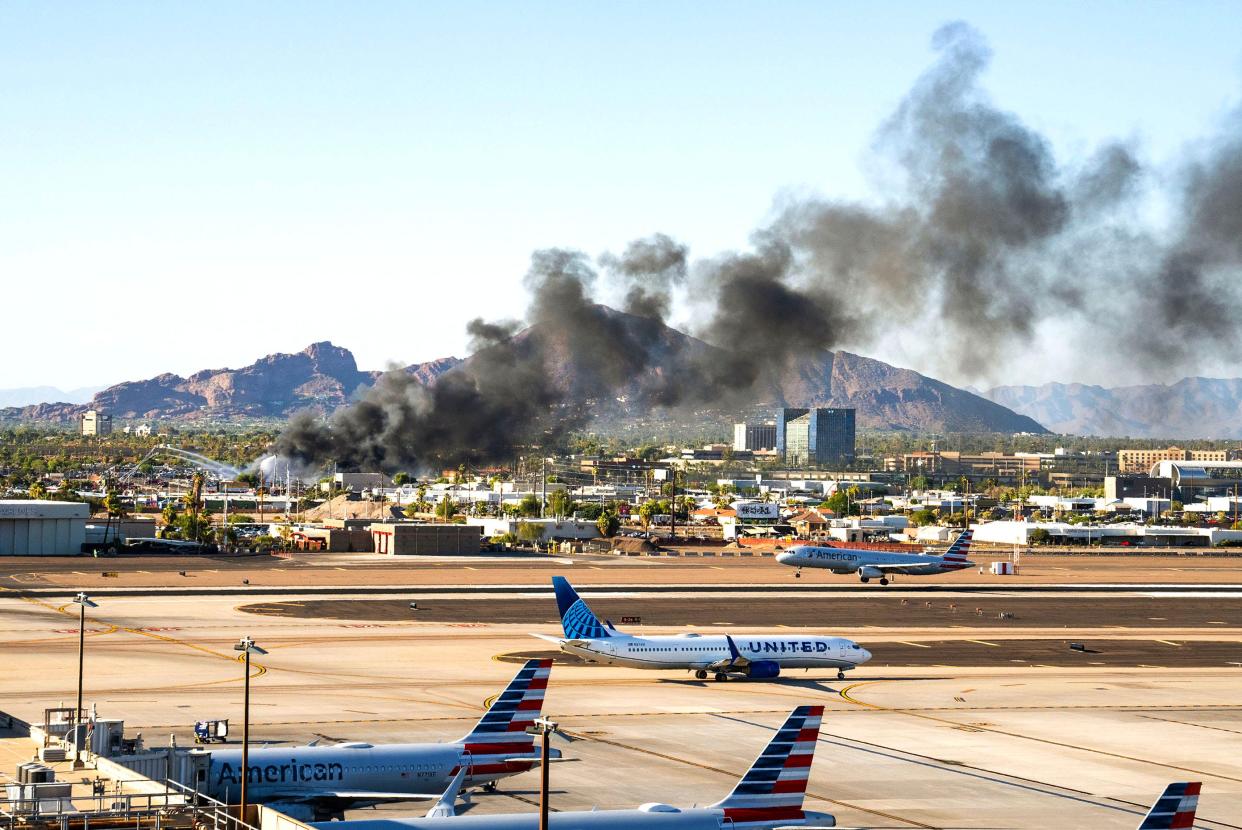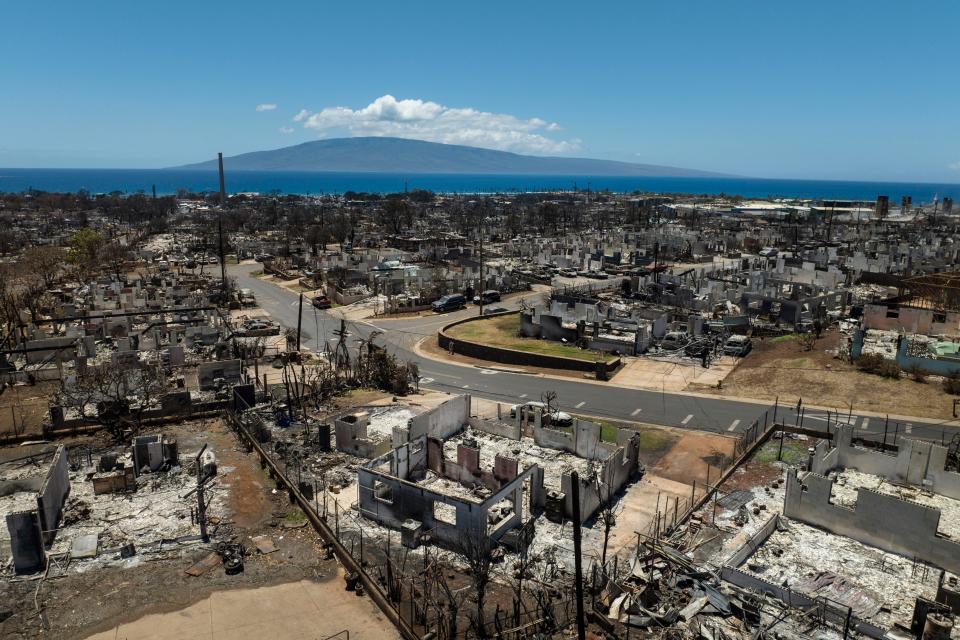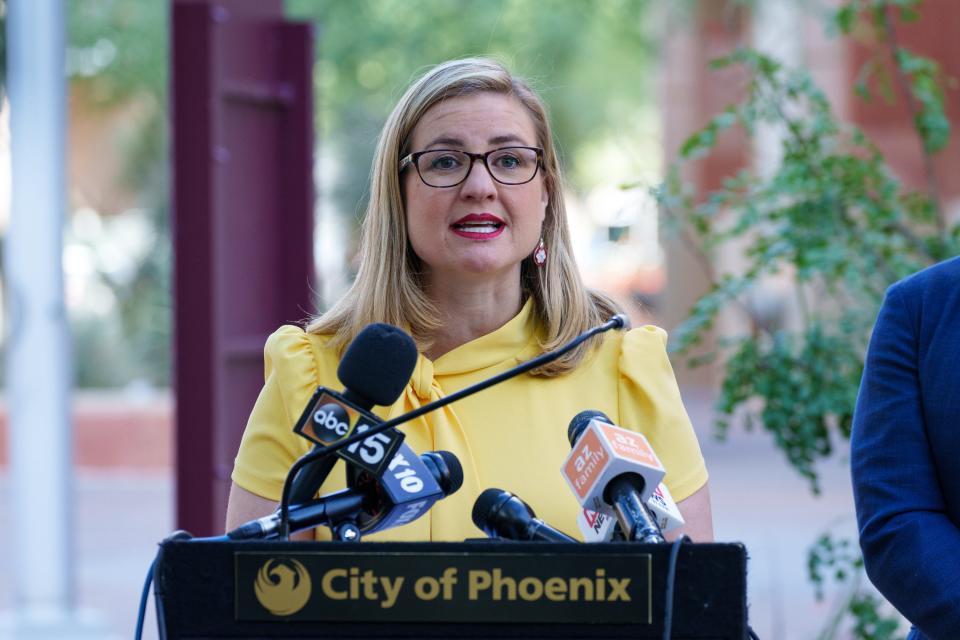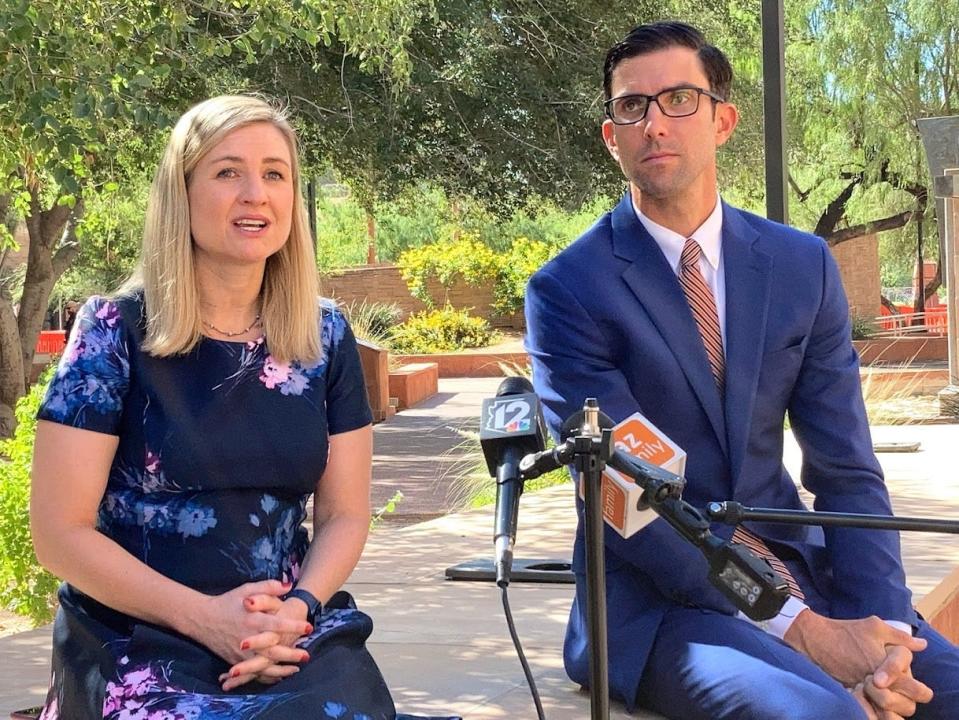Phoenix warns how climate change could cost the city, Sky Harbor and your investments

- Oops!Something went wrong.Please try again later.
Phoenix Sky Harbor International Airport could lose money in the future because of climate change and extreme weather, the city disclosed in May.
The city's Civic Improvement Corporation, a nonprofit entity of the city, issued a $96 million airport revenue bond series in May to pay back debts related to the smaller Deer Valley and Goodyear airports in the north and west Valley.
In the offering statement to potential investors, the Phoenix entity said wildfires, long-term effects of climate change, "passenger awareness of climate change impacts of aviation," as well as government regulation intended to reduce climate change effects, could harm the airport's "ability to generate revenue."
The disclosure is a rare and explicit acknowledgment from an Arizona city of the adverse consequences climate change could impose on its ability to repay debt. It represents an increased awareness of global warming's economic implications on the city, Phoenix taxpayers and market investors — most of whom are individuals.
More than 70% of municipal bonds are owned by individuals, often through mutual funds, and roughly 40% of municipal bond interest is paid to households with an annual income of less than $200,000, according to Municipal Bonds for America.
Lower revenue at Phoenix Sky Harbor International Airport would have financial implications for the airport, city and taxpayers. It could also mean lower yields for people who have invested in the airport revenue bonds for purposes such as retirement.
Mayor Kate Gallego responded to the disclosure on Monday, telling The Arizona Republic "climate change is undeniably our new reality" and that she has sought to "put this reality front-and-center in governance" in hopes it "can bring more awareness to this shared challenge."
Phoenix's disclosure in its airport revenue series represents enhanced transparency that municipal bond analysts say will protect investors and help maintain the integrity of the public market.
According to a report from Municipal Market Analytics, a Massachusetts-based municipal bond research firm, only two of 25 bond series issued by Valley cities and school districts in the first half of 2023 acknowledged the harmful role climate change could have on their ability to repay debt.
The U.S. Securities and Exchange Commission, the federal body that regulates the market for stocks and bonds, does not explicitly require climate risk disclosure. The Government Finance Officers Association in 2021, however, recommended new "best practices" that suggest doing so.
And while municipal market experts believe that the mandate will come in the future, Thomas Doe, president of Municipal Market Analytics, said the municipal bond industry has been slow to practice proper disclosure and price in the risk of climate change.
"The industry could be at the forefront of the climate issue but, to date, has demonstrated a limited ability with words and virtually no action," Doe wrote. "Instead, they have historically chosen to respond to crisis rather than anticipate negative events and adequately inform investors of risks."
That's likely because voluntarily disclosing the risk comes at a cost. Investors are more likely to demand more interest paid from the municipal issuers to compensate for the risk to their yield, Doe said.
"It's reasonable to assume that it might get hotter in Arizona (in the future). ... That might be a real risk that impacts the economy," Doe said. In other words, the more risk, the costlier it is for cities to borrow.
Gallego said the city's "proactive stance" on climate initiatives has positioned the city strongly in economic pitches because the city can be seen as "forward thinking."
How climate change could harm the airport
The Phoenix disclosure outlines a handful of ways climate change could harm the airport, and by extension, investors.
Weather patterns, droughts and fire could negatively affect the airport's operations and infrastructure, while new regulations could weaken the airport's financial conditions, the disclosure says.
It's not theoretical. Earlier in August, Hurricane Hilary, which was downgraded to a tropical storm, led to the cancellation of more than 150 flights at Sky Harbor. Extreme heat has grounded planes on three separate occasions in the airport's history: in 1990, when the temperature hit 122 degrees, and in 2013 and 2017 when the temperature hit 119 degrees.
And elsewhere, earlier in the summer, wildfires in Canada blanketed much of the northeastern United States in dense haze, forcing 600 flight cancellations and 2,500 delays, according to media reports at the time.
New regulations targeting greenhouse gas emissions could also "require significant upgrades to planes and facilities and increase the cost of jet fuel, or both, thereby increasing the cost of air travel and potentially reducing air travel demand," the disclosure says.

A potential safeguard for the airport is its geographic location, the offering statement says. Deputy Aviations Director Heather Shelbrack told The Republic the reason is two-fold. First, Phoenix doesn't get hurricanes that coastal airports experience. Second, being in the center of a major metropolitan, "we see another decrease vulnerability to events like wildfires and heavy flooding."
To mitigate adverse effects of climate change, Phoenix has purchased "commercial property and casualty insurance and business interruption insurance," the disclosure says.
But it concludes, "no assurance can be given that such insurance will always be available in sufficient amounts, at a reasonable cost or available at all, or that insurers will pay claims in a timely manner or at all."
As climate disasters increase, investors and analysts apply more scrutiny
As climate catastrophes become more frequent, so too does scrutiny over how adequately municipalities are preparing and warning investors.
Cynthia Hanawalt, a senior fellow at Columbia Law School's climate change think tank, said investors are beginning to demand more accountability and climate data from municipal bond issuers.
The recent deadly wildfire on Maui that devastated the historic town of Lahaina is one example of how climate change stands to harm investors.

Credit ratings and bond prices for the state's main utility provider, Hawaiian Electric, plummeted in the aftermath of the fire, meaning owners of those bonds are facing a financial loss.
Maui County officials have criticized and sued Hawaiian Electric for failing to shut off power on the island despite heavy winds, leading to downed lines that officials say sparked the fire.
Law firm Hagens Berman on Monday announced its intent to launch a class action lawsuit against the utility for bond investors who had experienced substantial losses.
While climate risk was disclosed prior to the incident, Doe of Municipal Market Analytics said, it raises questions about how accountable ratings agencies and municipalities should be for factoring in future risk versus solely the current conditions.
Credit ratings, from agencies such as Fitch or Moody's, help investors determine how risky an investment is. But those ratings, Doe said, are short-term outlooks regarding the issuer that only last for a year or two.
"So if you have debt that's 10 years or 30 years in length, the ratings don't apply to that. It doesn't capture that future risk," he said.
Across the country, in the $4 trillion municipal bond industry, Doe said "there has been no ratings change associated with climate risk." Instead, those ratings don't change until after disaster has struck, such as in Maui most recently.
Since municipal bonds are viewed as low-risk securities, meaning investors can confidently rely on payback, plus interest, Doe argues the integrity of the industry is at stake.
Without proper disclosure, investors stand to lose money because of climate risks that in some cases may have been knowable and quantifiable to some extent, Doe said. And if investors begin to lose confidence in municipal bonds, local governments' and schools' abilities to raise capital to fund critical infrastructure could start to dry up.
"If you know the risks are here, why does the rating not reflect it until the event happens?" Doe said, "and isn't it interesting the market doesn't price in the risk until the event occurs?"
In crisis mode: More homes mean more heat. Can new building codes help save metro Phoenix from disaster?
FEMA declaring heat a disaster could comfort market investors
The disclosure by Phoenix's Civic Improvement Corporation came about a month before Phoenix entered a blistering summer with record-breaking heat waves and a month after Gallego called on the Federal Emergency Management Agency to identify heat as an emergency disaster in her 2023 state of the city.
Gallego has continued to push FEMA since April, hoping to unlock federal financial aid to be used for cooling centers and other permanent infrastructure.

Aside from the benefit of helping residents who suffer heat-related injuries, securing support from FEMA for heat emergencies also stands to comfort market investors.
"In the case of hurricanes, the market has found comfort in FEMA’s historical support," said Doe and Chris Hamel, president and senior fellow respectively of Municipal Market Analytics.
With an extreme heat designation, Phoenix could lean on FEMA to reassure investors that an outside source of revenue is available to address climate emergency, thereby reducing danger to the city's own revenue.
Looking ahead: As Arizona builds to solve a housing crisis, will its homes withstand future heat extremes?
SEC expected to require climate risk disclosure for public companies this fall
Phoenix's climate risk acknowledgment also comes as the U.S. Securities and Exchange Commission debates regulatory proposals that would require public companies to disclose climate risk to investors. The proposal would not affect municipal issuers, such as Phoenix-area cities or school districts, but experts say it likely foreshadows similar requirements down the road.

Hanawalt said the SEC's proposal focuses on requiring companies to disclose both the physical risk that comes from weather disasters, as well as the transition costs that come with adapting to climate change.
"That, I think, should inform municipal issuers when they're thinking about making sure they're making full and complete disclosures. There's going to be a ripple effect of this disclosure rule."
Doe told The Republic he was scheduled to meet with attorneys from the SEC in September to discuss regulations regarding municipal bond climate disclosure.
Reporter Taylor Seely covers Phoenix for The Arizona Republic / azcentral.com. Reach her at tseely@arizonarepublic.com or by phone at 480-476-6116.
This article originally appeared on Arizona Republic: Sky Harbor could lose money from climate change, Phoenix warns

